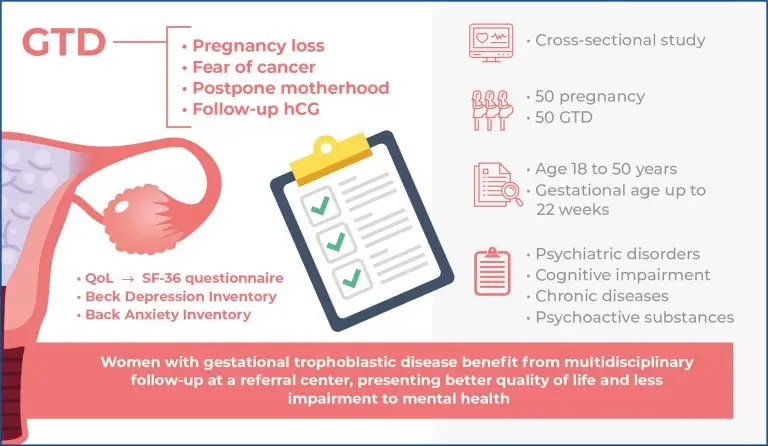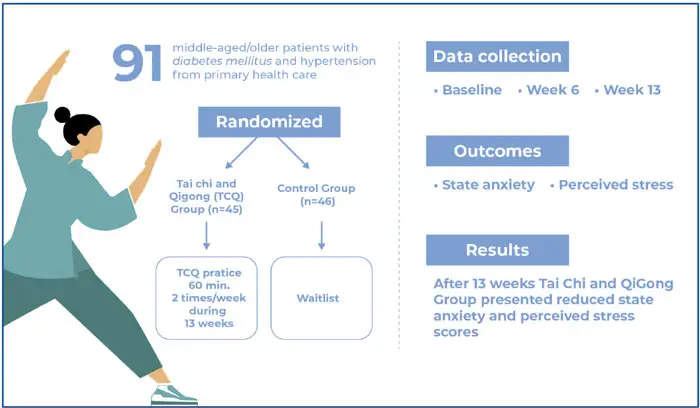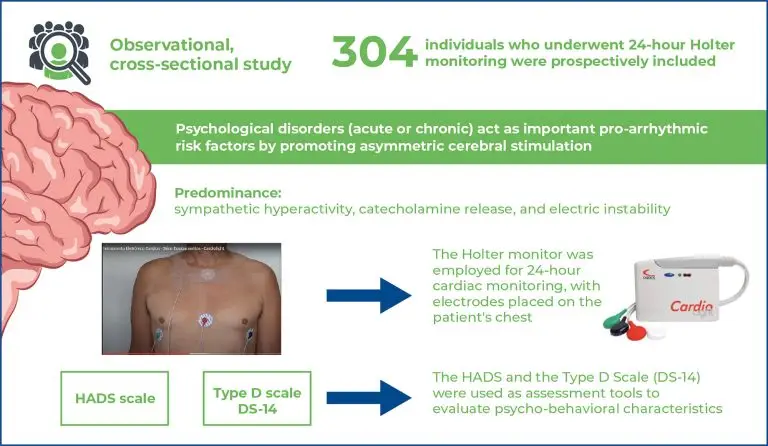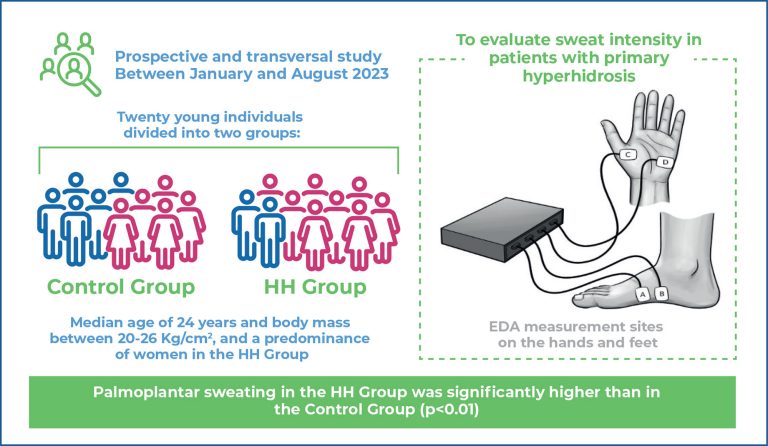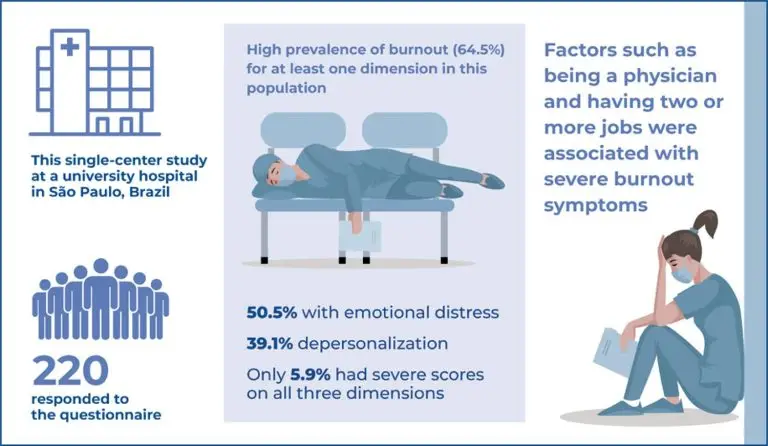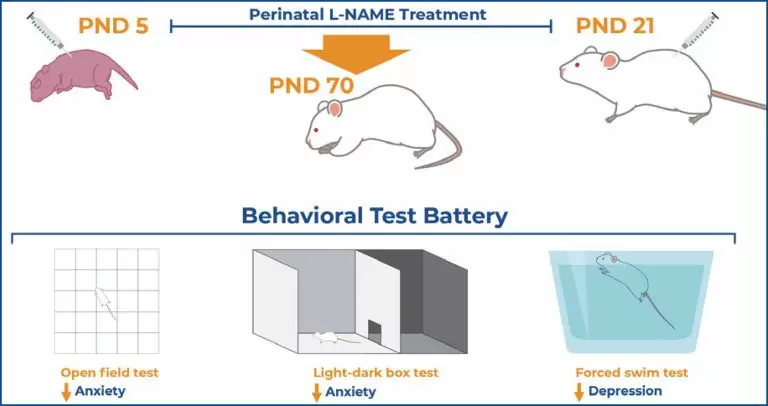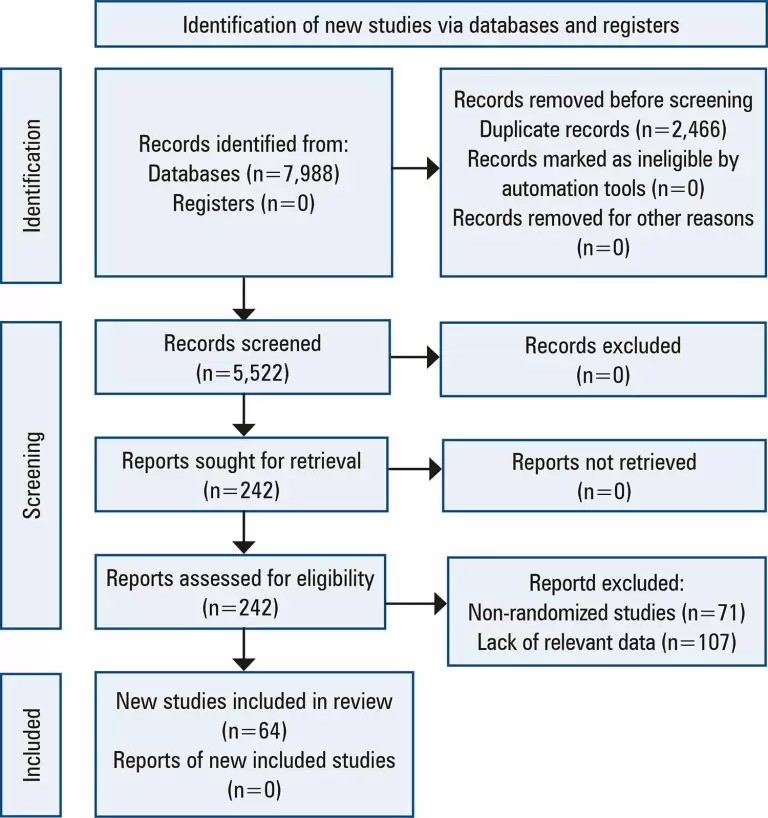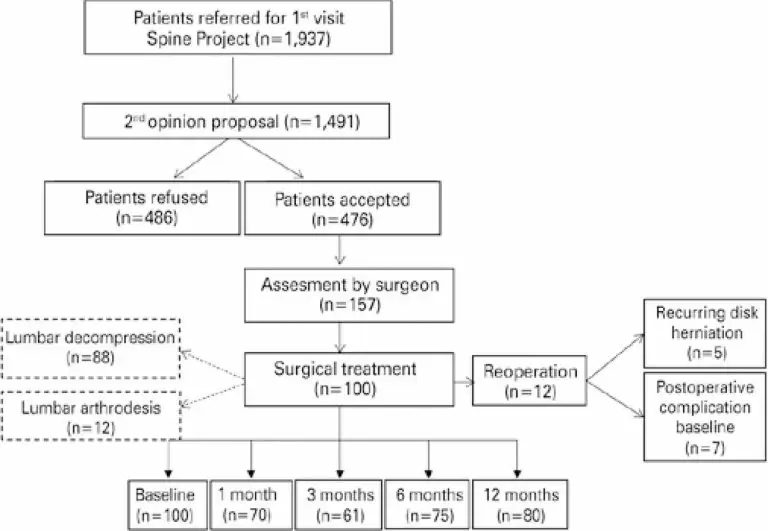22/Apr/2025
Psychological impact of gestational trophoblastic disease: a cross-sectional study
einstein (São Paulo). 22/Apr/2025;23:eAO1014.
View Article22/Apr/2025
Psychological impact of gestational trophoblastic disease: a cross-sectional study
DOI: 10.31744/einstein_journal/2025AO1014
Highlights ■ Gestational trophoblastic disease should be followed up at a referral center. ■ Adequate follow-up improves quality of life for affected women. ■ Multidisciplinary monitoring reduces anxiety and depression in women. ABSTRACT Objective: To evaluate the psychological repercussions of gestational trophoblastic disease. Methods: A cross-sectional study including 100 women (50 with gestational trophoblastic disease and 50 without) was conducted between September 2020 and October 2021. Socio-demographic characteristics, quality of life, depression, and anxiety were evaluated and follow-up was performed […]
Keywords: Anxiety; Depression; Gestational trophoblastic disease; Mental Health; Quality of life; Surveys and questionnaires
17/Mar/2025
Effects of Tai Chi and Qigong intervention on anxiety and stress in diabetic and hypertensive Brazilian patients: a randomized controlled trial
einstein (São Paulo). 17/Mar/2025;23:eAO1076.
View Article17/Mar/2025
Effects of Tai Chi and Qigong intervention on anxiety and stress in diabetic and hypertensive Brazilian patients: a randomized controlled trial
DOI: 10.31744/einstein_journal/2025AO1076
Highlights ■ A 13-week Tai Chi/Qigong program significantly reducedanxiety and stress in Brazilian patients with diabetes and hypertension. ■ Tai Chi/Qigong offers an effective complementary therapy to improve health outcomes in primary care settings. ■ This study highlights the potential of Tai Chi/Qigong for enhancing mental and physical well-being in chronic disease management. ABSTRACT Objective: This study investigated the effects of Tai Chi/Qigong practice over 13 weeks on anxiety and perceived stress levels in middle-aged or older Brazilian hypertensive and […]
Keywords: Aged; Anxiety; Complementary therapeutic methods; Diabetes mellitus; Hypertension; Middle aged; Outcome assessment (Health care); Perceived stress scale; Primary Health Care; Qigong; Stress, psychological; Tai ji
14/Mar/2025
Is self-perception of cardiac symptoms related to the psychological profile of patients? A cross-sectional study of individuals undergoing 24-hour Holter monitoring
einstein (São Paulo). 14/Mar/2025;23:eAO0742.
View Article14/Mar/2025
Is self-perception of cardiac symptoms related to the psychological profile of patients? A cross-sectional study of individuals undergoing 24-hour Holter monitoring
DOI: 10.31744/einstein_journal/2025AO0742
Highlights ■ Self-reported cardiac symptoms not associated with arrhythmias. ■ High prevalence of anxiety and depression symptoms. ■ Anxiety was correlated with self-reported cardiac symptoms. ABSTRACT Objective: This study aimed to examine the presence of psychological characteristics and their association with self-reported cardiac symptoms in individuals undergoing 24- hour Holter monitoring. Methods: This observational cross-sectional study included 304 individuals who consecutively underwent 24-hour Holter monitoring. Clinical, demographic, and electrocardiographic data were collected. Psycho-behavioral characteristics were assessed using the Hospital Anxiety […]
Keywords: Anxiety; Arrhythmias, Cardiac; Electrocardiography; Electrocardiography, ambulatory; Heart diseases; Holtermonitoring; Mental Health; Monitoring, physiologic
21/Nov/2024
Continuous evaluation of exosomatic electrodermal activity in patients with primary palmoplantar hyperhidrosis
einstein (São Paulo). 21/Nov/2024;22:eAO1152.
View Article21/Nov/2024
Continuous evaluation of exosomatic electrodermal activity in patients with primary palmoplantar hyperhidrosis
DOI: 10.31744/einstein_journal/2024AO1152
Highlights ■ Continuous exosomatic electrodermal activity was associated with higher skin conductance levels in patients with hyperhidrosis. ■ Palmoplantar sweating was significantly higher in the hyperhidrosis group than in the control group (p<0.01). ■ Electrodermal activity is an effective and simple method for objectively quantifying sweating in patients with hyperhidrosis. ABSTRACT Objective: To objectively evaluate sweat intensity in patients with primary hyperhidrosis by measuring electrodermal activity using a continuous exosomatic technique without external stimuli. Methods: This prospective and transversal study […]
Keywords: Anxiety; Depression; Galvanic skin response; Hyperhidrosis; Palmoplantar sweating; Perception; Surveys and questionnaires; Sweat
20/Aug/2024
Prevalence and risk factors of Burnout syndrome among intensive care unit members during the second wave of COVID-19: a single-center study
einstein (São Paulo). 20/Aug/2024;22:eAO0271.
View Article20/Aug/2024
Prevalence and risk factors of Burnout syndrome among intensive care unit members during the second wave of COVID-19: a single-center study
DOI: 10.31744/einstein_journal/2024AO0271
Highlights A single-center study evaluated the prevalence and risk factors for Burnout syndrome in intensive care unit teams. The study revealed a high prevalence of Burnout syndrome in at least one dimension. Factors such as profession and having two or more jobs were associated with severe burnout symptoms. The study highlighted the need for interventions and support to address burnout among intensive care unit teams. ABSTRACT Objective: To evaluate the prevalence of burnout among the intensive care unit team of […]
Keywords: Anxiety; Burnout, psychological; COVID-19; Intensive care units; Pandemics; Stress, psychological; Surveys and questionnaires
23/Nov/2023
Perinatal N(G)-Nitro-L-arginine methyl ester administration decreases anxiety- and depression-like behaviors in adult mice
einstein (São Paulo). 23/Nov/2023;21:eAO0302.
View Article23/Nov/2023
Perinatal N(G)-Nitro-L-arginine methyl ester administration decreases anxiety- and depression-like behaviors in adult mice
DOI: 10.31744/einstein_journal/2023AO0302
Highlights Perinatal L-NAME treatment decreased anxiety- and depression-like behaviors in adult mice. Perinatal L-NAME treatment did not promote changes in locomotor activity in adult mice. Perinatal L-NAME treatment did not alter pain perception ABSTRACT Objective: We hypothesized that perinatal manipulations of the nitrergic system would affect adult animal behaviors. Methods: We tested this hypothesis by perinatally administering N(G)-Nitro-L-arginine methyl ester (L-NAME), a non-specific antagonist of nitric oxide synthase for 15 days and assessed anxiety- and depression-like behaviors in adult mice. […]
Keywords: Anxiety; Depression; Mice; NG-nitroarginine methyl ester; Nitric oxide; Pain perception
31/Jul/2023
The effects of gratitude interventions: a systematic review and meta-analysis
DOI: 10.31744/einstein_journal/2023RW0371
ABSTRACT Introduction Gratitude has several implications. Over time, a logical relationship has been established between gratitude and well-being. In addition, researchers aimed to establish associations between gratitude and other factors of positive feelings using scientific methods. We conducted a systematic review and meta-analysis of interventions to develop gratitude and its benefits to human beings. Objective This study aimed to evaluate and quantify the available scientific evidence on interventions to acquire knowledge on gratitude as a quantifiable causal factor of benefit […]
Keywords: Anxiety; Delivery of health care; Depression; Emotions; Gratitude; Health facilities; Mental Health; Narration; Personnel satisfaction
22/Mar/2022
Clinical outcome analysis in surgical patients enrolled in a Second Opinion Program in spine surgery
DOI: 10.31744/einstein_journal/2022AO5791
ABSTRACT Objective To analyze pain, functional capacity, quality of life, anxiety and depression outcomes in patients undergoing lumbar spine surgery following use of the Second Opinion Program, and to present disagreements regarding diagnoses and therapeutic indications between the first and second opinions. Methods A prospective, observational cohort study with 100 patients enrolled in the Second Opinion Program who underwent lumbar spine surgery. Questionnaires addressing pain intensity, level of disability, quality of life, anxiety and depression were applied prior to and […]
Keywords: Anxiety; Arthrodesis; Depression; Low back pain; Pain management; Quality of life; Referral and consultation; Spinal diseases/surgery; Treatment outcome
09/Dec/2019
Prevalence and intensity of pain during diagnostic hysteroscopy in women attending an infertility clinic: analysis of 489 cases
einstein (São Paulo). 09/Dec/2019;18:eAO4916.
View Article09/Dec/2019
Prevalence and intensity of pain during diagnostic hysteroscopy in women attending an infertility clinic: analysis of 489 cases
DOI: 10.31744/einstein_journal/2020AO4916
ABSTRACT Objective To investigate the prevalence and intensity of pain perception during diagnostic hysteroscopy in women and potential related factors. Methods A total of 489 women were investigated at an infertility clinic. Fluid diagnostic hysteroscopy was performed without analgesia or anesthesia by gynecologists with different levels of experience in operative hysteroscopy, using a 2.9mm rigid scope. The Visual Analog Scale was used to score pain intensity after vaginal speculum insertion and after hysteroscopy. Data collected included age, ethnicity, body mass […]
Keywords: Anxiety; Hysteroscopy; Infertility; Pain perception; Visual Analog Scale
01/Jan/2017
Depression and anxiety in a case series of amyotrophic lateral sclerosis: frequency and association with clinical features
einstein (São Paulo). 01/Jan/2017;15(1):58-60.
View Article01/Jan/2017
Depression and anxiety in a case series of amyotrophic lateral sclerosis: frequency and association with clinical features
DOI: 10.1590/S1679-45082017AO3870
ABSTRACT Objective To investigate the frequency of anxiety and depression and their association with clinical features of amyotrophic lateral sclerosis. Methods This is a cross-sectional and descriptive study including a consecutive series of patients with sporadic amyotrophic lateral sclerosis according to Awaji’s criteria. Patients underwent clinical and psychiatric assessment (anxiety and depression symptoms). Results We included 76 patients. The men/women ratio was 1.6:1. Participants’ mean age at disease onset was 55 years (SD±12.1). Sixty-six patients (86.8%) were able to complete […]
Keywords: Amyotrophic lateral sclerosis/diagnosis; Anxiety; Depression


